A Study of Islamic Culture: Women, Deen, Beliefs, and Globalization
VerifiedAdded on 2022/10/01
|9
|3405
|92
Report
AI Summary
This report provides a comprehensive analysis of Islamic culture, addressing key aspects such as the status of women in Islam and the contrasting Western perspectives on this issue. It delves into the Quran and Sunnah to provide a detailed understanding of the rights and roles of women within the faith. The report also explores the multifaceted concept of 'Deen' within the Quran, examining its various interpretations and significance. Furthermore, it outlines the six fundamental pillars of belief in Islam, crucial for a Muslim's faith. Finally, it examines the perceived risks of globalization and the diverse attitudes of Muslims towards this phenomenon, providing a nuanced understanding of its impact on Islamic societies and values.
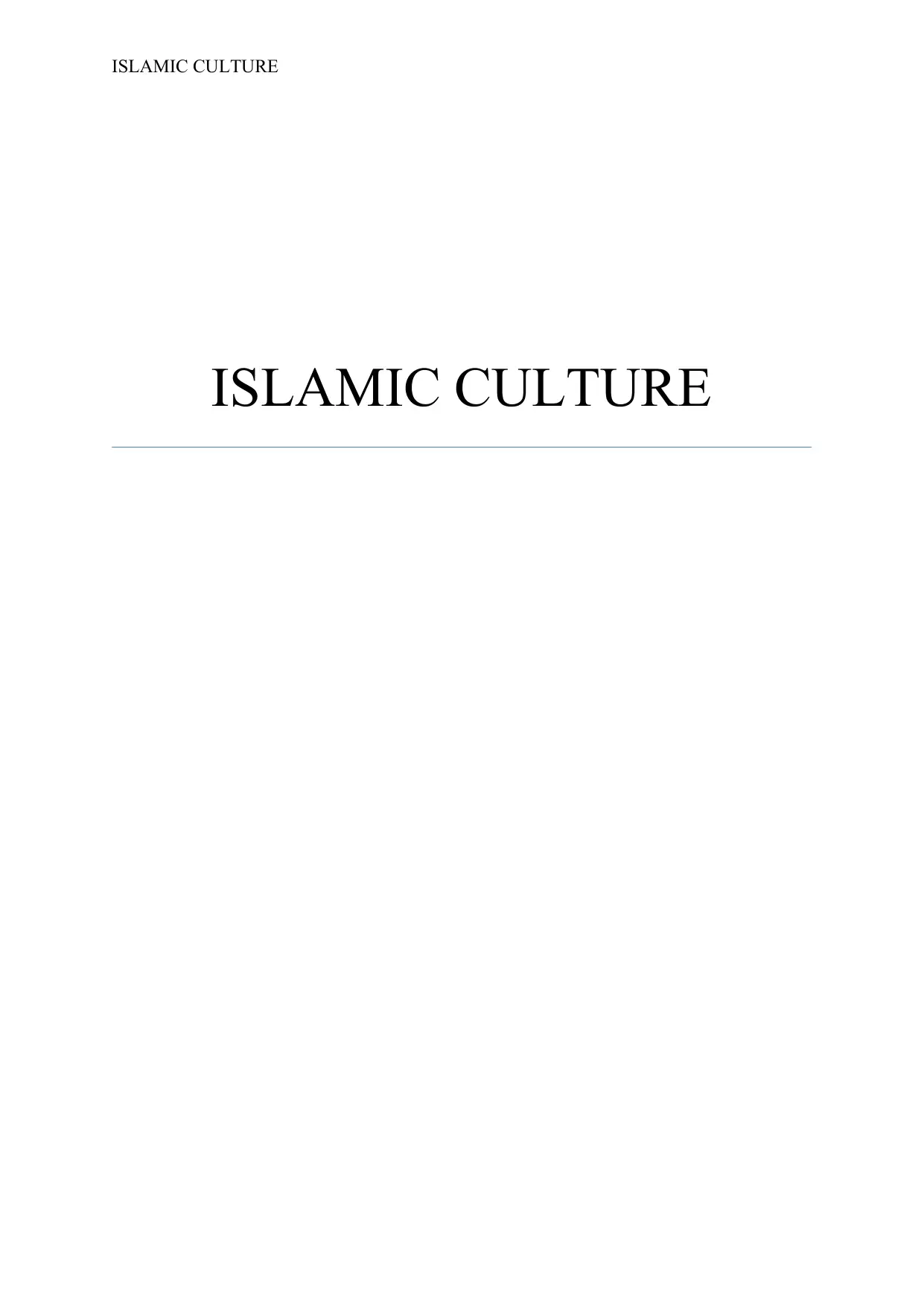
ISLAMIC CULTURE
ISLAMIC CULTURE
ISLAMIC CULTURE
Paraphrase This Document
Need a fresh take? Get an instant paraphrase of this document with our AI Paraphraser
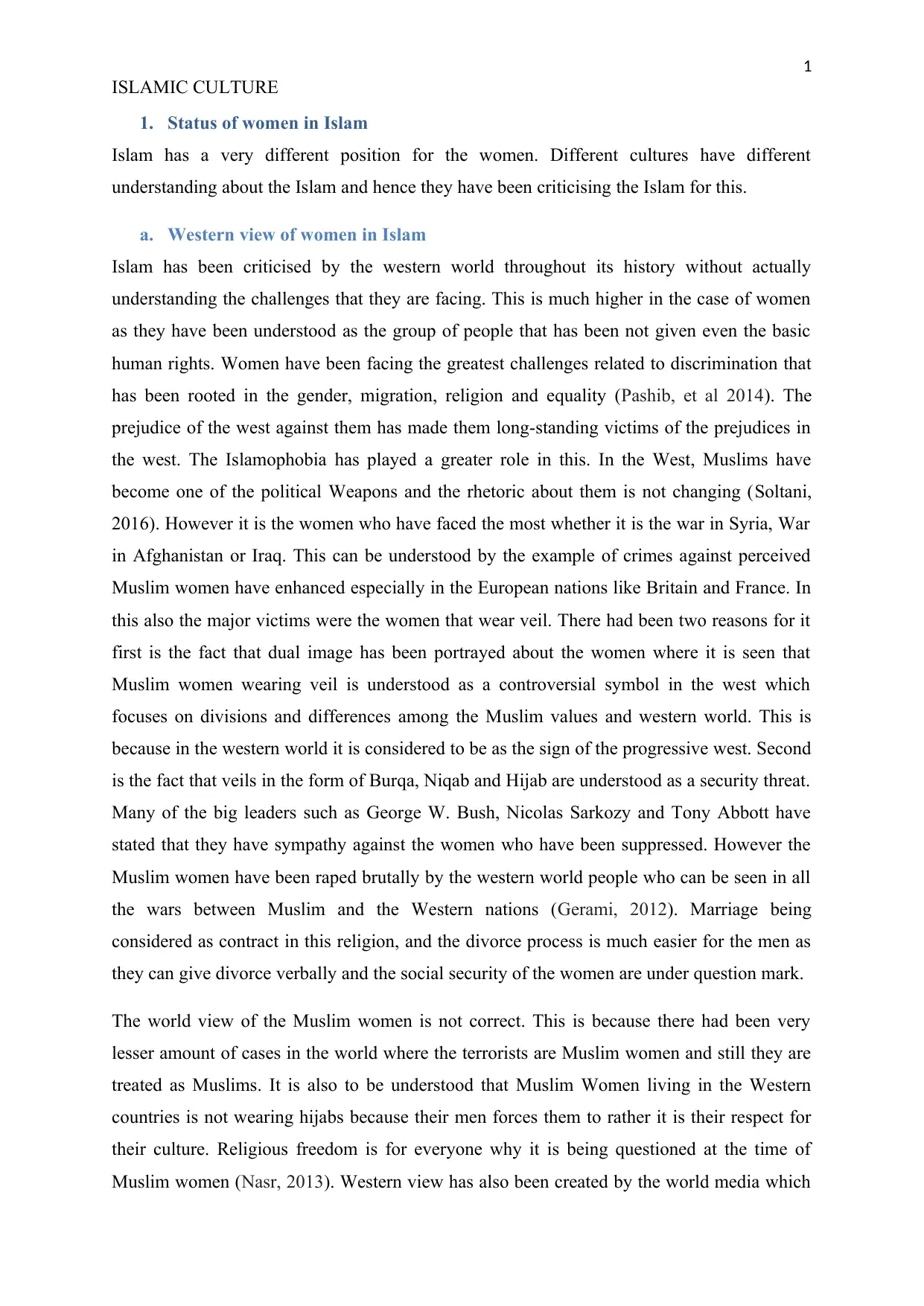
1
ISLAMIC CULTURE
1. Status of women in Islam
Islam has a very different position for the women. Different cultures have different
understanding about the Islam and hence they have been criticising the Islam for this.
a. Western view of women in Islam
Islam has been criticised by the western world throughout its history without actually
understanding the challenges that they are facing. This is much higher in the case of women
as they have been understood as the group of people that has been not given even the basic
human rights. Women have been facing the greatest challenges related to discrimination that
has been rooted in the gender, migration, religion and equality (Pashib, et al 2014). The
prejudice of the west against them has made them long-standing victims of the prejudices in
the west. The Islamophobia has played a greater role in this. In the West, Muslims have
become one of the political Weapons and the rhetoric about them is not changing (Soltani,
2016). However it is the women who have faced the most whether it is the war in Syria, War
in Afghanistan or Iraq. This can be understood by the example of crimes against perceived
Muslim women have enhanced especially in the European nations like Britain and France. In
this also the major victims were the women that wear veil. There had been two reasons for it
first is the fact that dual image has been portrayed about the women where it is seen that
Muslim women wearing veil is understood as a controversial symbol in the west which
focuses on divisions and differences among the Muslim values and western world. This is
because in the western world it is considered to be as the sign of the progressive west. Second
is the fact that veils in the form of Burqa, Niqab and Hijab are understood as a security threat.
Many of the big leaders such as George W. Bush, Nicolas Sarkozy and Tony Abbott have
stated that they have sympathy against the women who have been suppressed. However the
Muslim women have been raped brutally by the western world people who can be seen in all
the wars between Muslim and the Western nations (Gerami, 2012). Marriage being
considered as contract in this religion, and the divorce process is much easier for the men as
they can give divorce verbally and the social security of the women are under question mark.
The world view of the Muslim women is not correct. This is because there had been very
lesser amount of cases in the world where the terrorists are Muslim women and still they are
treated as Muslims. It is also to be understood that Muslim Women living in the Western
countries is not wearing hijabs because their men forces them to rather it is their respect for
their culture. Religious freedom is for everyone why it is being questioned at the time of
Muslim women (Nasr, 2013). Western view has also been created by the world media which
ISLAMIC CULTURE
1. Status of women in Islam
Islam has a very different position for the women. Different cultures have different
understanding about the Islam and hence they have been criticising the Islam for this.
a. Western view of women in Islam
Islam has been criticised by the western world throughout its history without actually
understanding the challenges that they are facing. This is much higher in the case of women
as they have been understood as the group of people that has been not given even the basic
human rights. Women have been facing the greatest challenges related to discrimination that
has been rooted in the gender, migration, religion and equality (Pashib, et al 2014). The
prejudice of the west against them has made them long-standing victims of the prejudices in
the west. The Islamophobia has played a greater role in this. In the West, Muslims have
become one of the political Weapons and the rhetoric about them is not changing (Soltani,
2016). However it is the women who have faced the most whether it is the war in Syria, War
in Afghanistan or Iraq. This can be understood by the example of crimes against perceived
Muslim women have enhanced especially in the European nations like Britain and France. In
this also the major victims were the women that wear veil. There had been two reasons for it
first is the fact that dual image has been portrayed about the women where it is seen that
Muslim women wearing veil is understood as a controversial symbol in the west which
focuses on divisions and differences among the Muslim values and western world. This is
because in the western world it is considered to be as the sign of the progressive west. Second
is the fact that veils in the form of Burqa, Niqab and Hijab are understood as a security threat.
Many of the big leaders such as George W. Bush, Nicolas Sarkozy and Tony Abbott have
stated that they have sympathy against the women who have been suppressed. However the
Muslim women have been raped brutally by the western world people who can be seen in all
the wars between Muslim and the Western nations (Gerami, 2012). Marriage being
considered as contract in this religion, and the divorce process is much easier for the men as
they can give divorce verbally and the social security of the women are under question mark.
The world view of the Muslim women is not correct. This is because there had been very
lesser amount of cases in the world where the terrorists are Muslim women and still they are
treated as Muslims. It is also to be understood that Muslim Women living in the Western
countries is not wearing hijabs because their men forces them to rather it is their respect for
their culture. Religious freedom is for everyone why it is being questioned at the time of
Muslim women (Nasr, 2013). Western view has also been created by the world media which
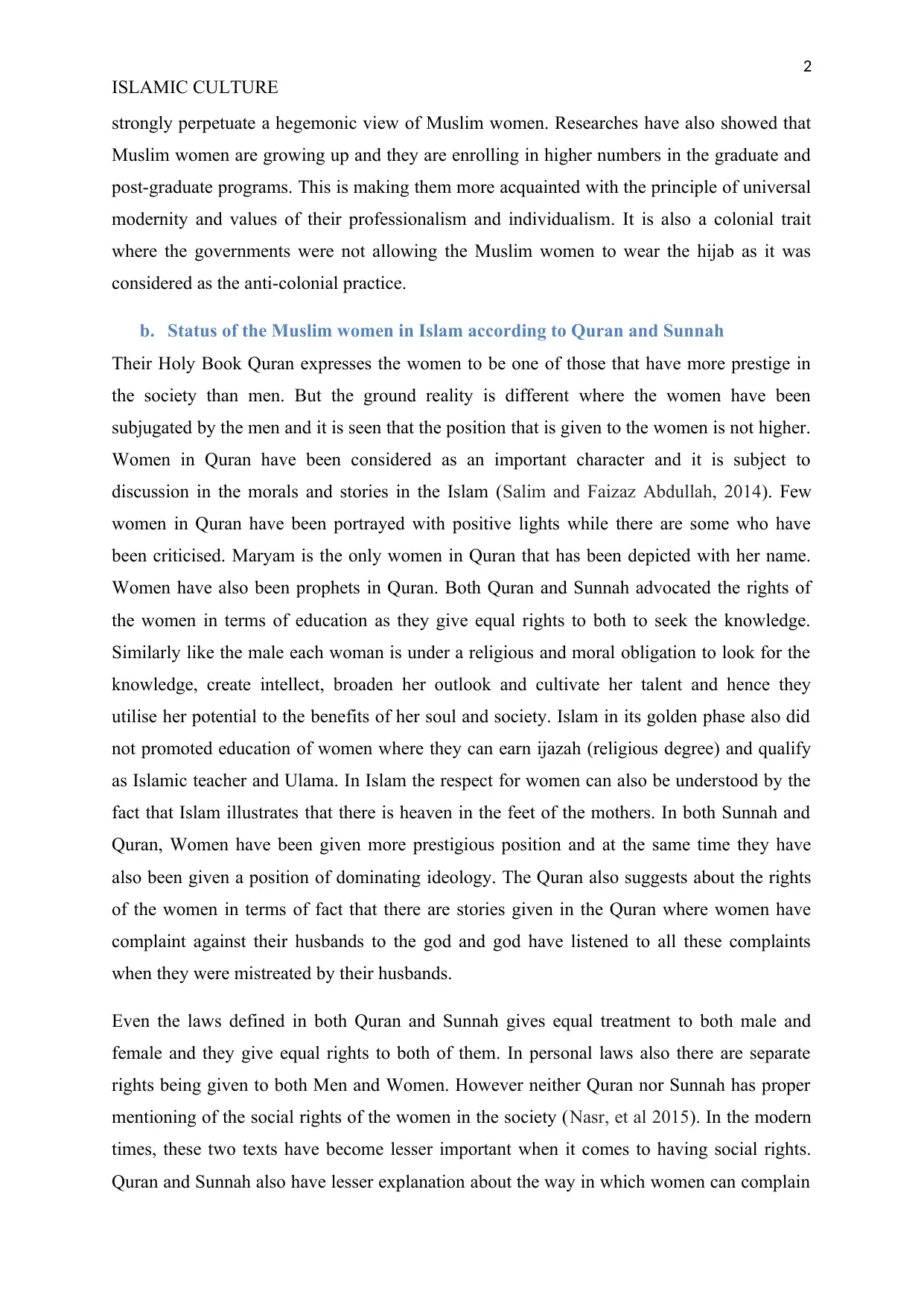
2
ISLAMIC CULTURE
strongly perpetuate a hegemonic view of Muslim women. Researches have also showed that
Muslim women are growing up and they are enrolling in higher numbers in the graduate and
post-graduate programs. This is making them more acquainted with the principle of universal
modernity and values of their professionalism and individualism. It is also a colonial trait
where the governments were not allowing the Muslim women to wear the hijab as it was
considered as the anti-colonial practice.
b. Status of the Muslim women in Islam according to Quran and Sunnah
Their Holy Book Quran expresses the women to be one of those that have more prestige in
the society than men. But the ground reality is different where the women have been
subjugated by the men and it is seen that the position that is given to the women is not higher.
Women in Quran have been considered as an important character and it is subject to
discussion in the morals and stories in the Islam (Salim and Faizaz Abdullah, 2014). Few
women in Quran have been portrayed with positive lights while there are some who have
been criticised. Maryam is the only women in Quran that has been depicted with her name.
Women have also been prophets in Quran. Both Quran and Sunnah advocated the rights of
the women in terms of education as they give equal rights to both to seek the knowledge.
Similarly like the male each woman is under a religious and moral obligation to look for the
knowledge, create intellect, broaden her outlook and cultivate her talent and hence they
utilise her potential to the benefits of her soul and society. Islam in its golden phase also did
not promoted education of women where they can earn ijazah (religious degree) and qualify
as Islamic teacher and Ulama. In Islam the respect for women can also be understood by the
fact that Islam illustrates that there is heaven in the feet of the mothers. In both Sunnah and
Quran, Women have been given more prestigious position and at the same time they have
also been given a position of dominating ideology. The Quran also suggests about the rights
of the women in terms of fact that there are stories given in the Quran where women have
complaint against their husbands to the god and god have listened to all these complaints
when they were mistreated by their husbands.
Even the laws defined in both Quran and Sunnah gives equal treatment to both male and
female and they give equal rights to both of them. In personal laws also there are separate
rights being given to both Men and Women. However neither Quran nor Sunnah has proper
mentioning of the social rights of the women in the society (Nasr, et al 2015). In the modern
times, these two texts have become lesser important when it comes to having social rights.
Quran and Sunnah also have lesser explanation about the way in which women can complain
ISLAMIC CULTURE
strongly perpetuate a hegemonic view of Muslim women. Researches have also showed that
Muslim women are growing up and they are enrolling in higher numbers in the graduate and
post-graduate programs. This is making them more acquainted with the principle of universal
modernity and values of their professionalism and individualism. It is also a colonial trait
where the governments were not allowing the Muslim women to wear the hijab as it was
considered as the anti-colonial practice.
b. Status of the Muslim women in Islam according to Quran and Sunnah
Their Holy Book Quran expresses the women to be one of those that have more prestige in
the society than men. But the ground reality is different where the women have been
subjugated by the men and it is seen that the position that is given to the women is not higher.
Women in Quran have been considered as an important character and it is subject to
discussion in the morals and stories in the Islam (Salim and Faizaz Abdullah, 2014). Few
women in Quran have been portrayed with positive lights while there are some who have
been criticised. Maryam is the only women in Quran that has been depicted with her name.
Women have also been prophets in Quran. Both Quran and Sunnah advocated the rights of
the women in terms of education as they give equal rights to both to seek the knowledge.
Similarly like the male each woman is under a religious and moral obligation to look for the
knowledge, create intellect, broaden her outlook and cultivate her talent and hence they
utilise her potential to the benefits of her soul and society. Islam in its golden phase also did
not promoted education of women where they can earn ijazah (religious degree) and qualify
as Islamic teacher and Ulama. In Islam the respect for women can also be understood by the
fact that Islam illustrates that there is heaven in the feet of the mothers. In both Sunnah and
Quran, Women have been given more prestigious position and at the same time they have
also been given a position of dominating ideology. The Quran also suggests about the rights
of the women in terms of fact that there are stories given in the Quran where women have
complaint against their husbands to the god and god have listened to all these complaints
when they were mistreated by their husbands.
Even the laws defined in both Quran and Sunnah gives equal treatment to both male and
female and they give equal rights to both of them. In personal laws also there are separate
rights being given to both Men and Women. However neither Quran nor Sunnah has proper
mentioning of the social rights of the women in the society (Nasr, et al 2015). In the modern
times, these two texts have become lesser important when it comes to having social rights.
Quran and Sunnah also have lesser explanation about the way in which women can complain
⊘ This is a preview!⊘
Do you want full access?
Subscribe today to unlock all pages.

Trusted by 1+ million students worldwide
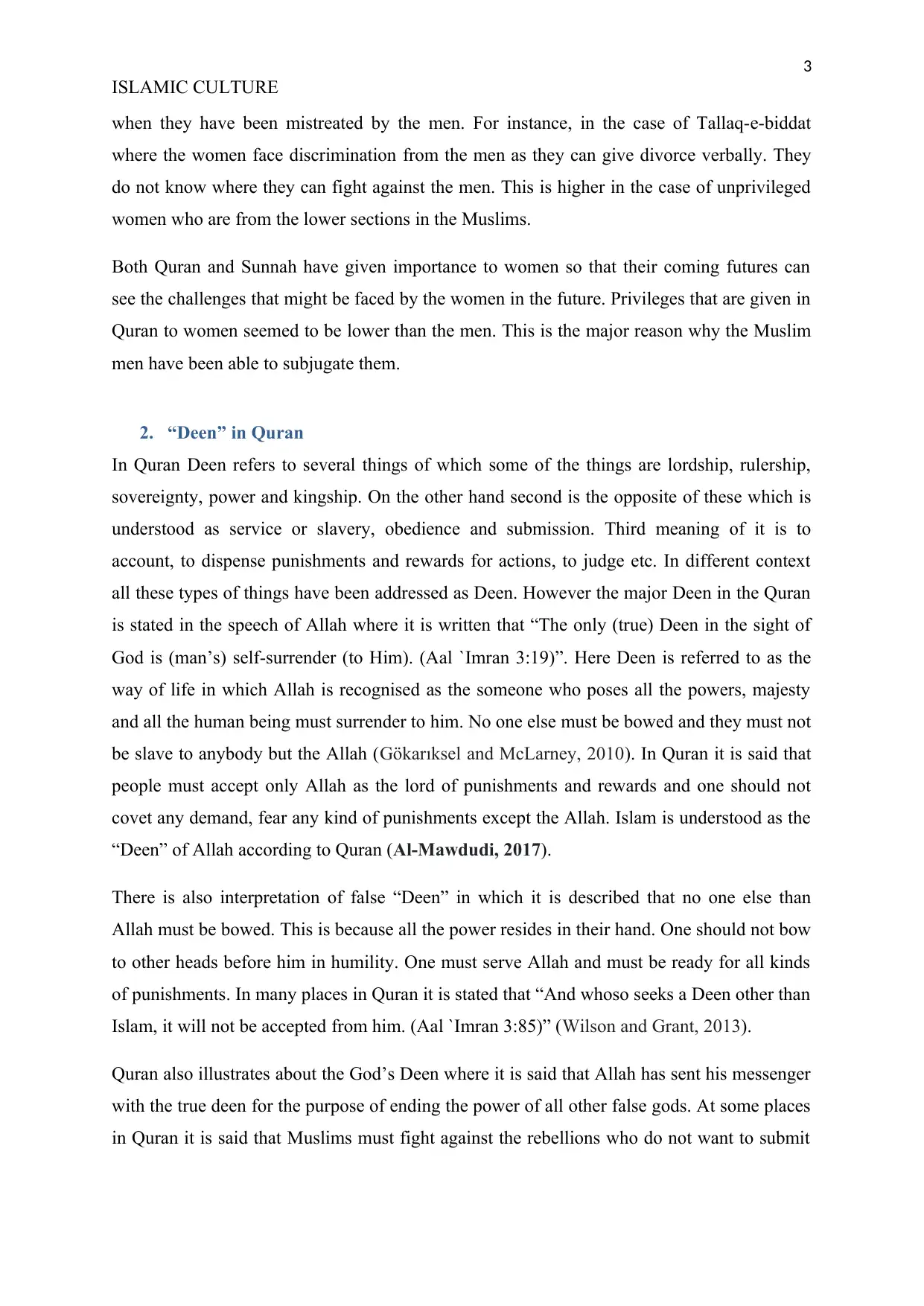
3
ISLAMIC CULTURE
when they have been mistreated by the men. For instance, in the case of Tallaq-e-biddat
where the women face discrimination from the men as they can give divorce verbally. They
do not know where they can fight against the men. This is higher in the case of unprivileged
women who are from the lower sections in the Muslims.
Both Quran and Sunnah have given importance to women so that their coming futures can
see the challenges that might be faced by the women in the future. Privileges that are given in
Quran to women seemed to be lower than the men. This is the major reason why the Muslim
men have been able to subjugate them.
2. “Deen” in Quran
In Quran Deen refers to several things of which some of the things are lordship, rulership,
sovereignty, power and kingship. On the other hand second is the opposite of these which is
understood as service or slavery, obedience and submission. Third meaning of it is to
account, to dispense punishments and rewards for actions, to judge etc. In different context
all these types of things have been addressed as Deen. However the major Deen in the Quran
is stated in the speech of Allah where it is written that “The only (true) Deen in the sight of
God is (man’s) self-surrender (to Him). (Aal `Imran 3:19)”. Here Deen is referred to as the
way of life in which Allah is recognised as the someone who poses all the powers, majesty
and all the human being must surrender to him. No one else must be bowed and they must not
be slave to anybody but the Allah (Gökarıksel and McLarney, 2010). In Quran it is said that
people must accept only Allah as the lord of punishments and rewards and one should not
covet any demand, fear any kind of punishments except the Allah. Islam is understood as the
“Deen” of Allah according to Quran (Al-Mawdudi, 2017).
There is also interpretation of false “Deen” in which it is described that no one else than
Allah must be bowed. This is because all the power resides in their hand. One should not bow
to other heads before him in humility. One must serve Allah and must be ready for all kinds
of punishments. In many places in Quran it is stated that “And whoso seeks a Deen other than
Islam, it will not be accepted from him. (Aal `Imran 3:85)” (Wilson and Grant, 2013).
Quran also illustrates about the God’s Deen where it is said that Allah has sent his messenger
with the true deen for the purpose of ending the power of all other false gods. At some places
in Quran it is said that Muslims must fight against the rebellions who do not want to submit
ISLAMIC CULTURE
when they have been mistreated by the men. For instance, in the case of Tallaq-e-biddat
where the women face discrimination from the men as they can give divorce verbally. They
do not know where they can fight against the men. This is higher in the case of unprivileged
women who are from the lower sections in the Muslims.
Both Quran and Sunnah have given importance to women so that their coming futures can
see the challenges that might be faced by the women in the future. Privileges that are given in
Quran to women seemed to be lower than the men. This is the major reason why the Muslim
men have been able to subjugate them.
2. “Deen” in Quran
In Quran Deen refers to several things of which some of the things are lordship, rulership,
sovereignty, power and kingship. On the other hand second is the opposite of these which is
understood as service or slavery, obedience and submission. Third meaning of it is to
account, to dispense punishments and rewards for actions, to judge etc. In different context
all these types of things have been addressed as Deen. However the major Deen in the Quran
is stated in the speech of Allah where it is written that “The only (true) Deen in the sight of
God is (man’s) self-surrender (to Him). (Aal `Imran 3:19)”. Here Deen is referred to as the
way of life in which Allah is recognised as the someone who poses all the powers, majesty
and all the human being must surrender to him. No one else must be bowed and they must not
be slave to anybody but the Allah (Gökarıksel and McLarney, 2010). In Quran it is said that
people must accept only Allah as the lord of punishments and rewards and one should not
covet any demand, fear any kind of punishments except the Allah. Islam is understood as the
“Deen” of Allah according to Quran (Al-Mawdudi, 2017).
There is also interpretation of false “Deen” in which it is described that no one else than
Allah must be bowed. This is because all the power resides in their hand. One should not bow
to other heads before him in humility. One must serve Allah and must be ready for all kinds
of punishments. In many places in Quran it is stated that “And whoso seeks a Deen other than
Islam, it will not be accepted from him. (Aal `Imran 3:85)” (Wilson and Grant, 2013).
Quran also illustrates about the God’s Deen where it is said that Allah has sent his messenger
with the true deen for the purpose of ending the power of all other false gods. At some places
in Quran it is said that Muslims must fight against the rebellions who do not want to submit
Paraphrase This Document
Need a fresh take? Get an instant paraphrase of this document with our AI Paraphraser
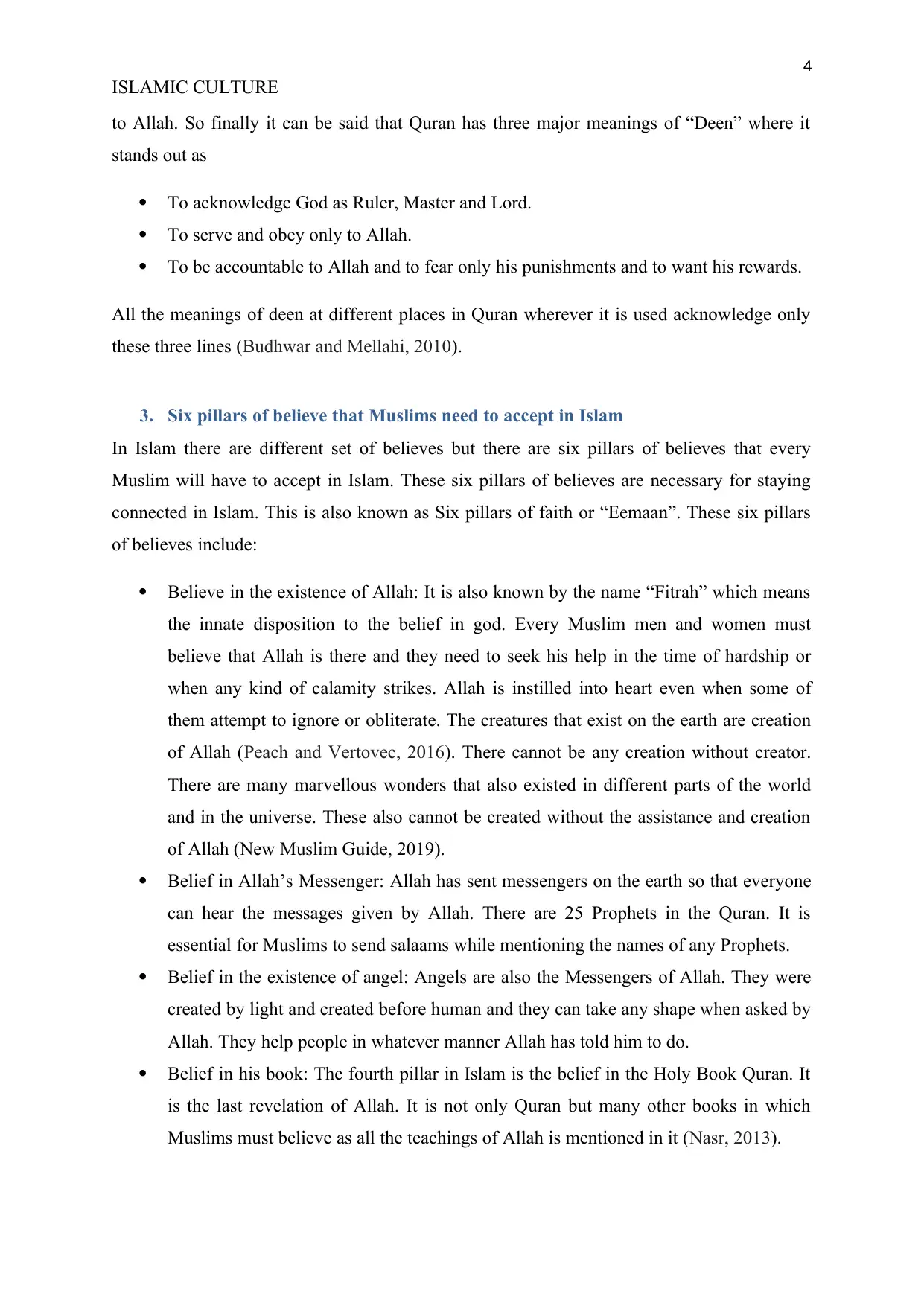
4
ISLAMIC CULTURE
to Allah. So finally it can be said that Quran has three major meanings of “Deen” where it
stands out as
To acknowledge God as Ruler, Master and Lord.
To serve and obey only to Allah.
To be accountable to Allah and to fear only his punishments and to want his rewards.
All the meanings of deen at different places in Quran wherever it is used acknowledge only
these three lines (Budhwar and Mellahi, 2010).
3. Six pillars of believe that Muslims need to accept in Islam
In Islam there are different set of believes but there are six pillars of believes that every
Muslim will have to accept in Islam. These six pillars of believes are necessary for staying
connected in Islam. This is also known as Six pillars of faith or “Eemaan”. These six pillars
of believes include:
Believe in the existence of Allah: It is also known by the name “Fitrah” which means
the innate disposition to the belief in god. Every Muslim men and women must
believe that Allah is there and they need to seek his help in the time of hardship or
when any kind of calamity strikes. Allah is instilled into heart even when some of
them attempt to ignore or obliterate. The creatures that exist on the earth are creation
of Allah (Peach and Vertovec, 2016). There cannot be any creation without creator.
There are many marvellous wonders that also existed in different parts of the world
and in the universe. These also cannot be created without the assistance and creation
of Allah (New Muslim Guide, 2019).
Belief in Allah’s Messenger: Allah has sent messengers on the earth so that everyone
can hear the messages given by Allah. There are 25 Prophets in the Quran. It is
essential for Muslims to send salaams while mentioning the names of any Prophets.
Belief in the existence of angel: Angels are also the Messengers of Allah. They were
created by light and created before human and they can take any shape when asked by
Allah. They help people in whatever manner Allah has told him to do.
Belief in his book: The fourth pillar in Islam is the belief in the Holy Book Quran. It
is the last revelation of Allah. It is not only Quran but many other books in which
Muslims must believe as all the teachings of Allah is mentioned in it (Nasr, 2013).
ISLAMIC CULTURE
to Allah. So finally it can be said that Quran has three major meanings of “Deen” where it
stands out as
To acknowledge God as Ruler, Master and Lord.
To serve and obey only to Allah.
To be accountable to Allah and to fear only his punishments and to want his rewards.
All the meanings of deen at different places in Quran wherever it is used acknowledge only
these three lines (Budhwar and Mellahi, 2010).
3. Six pillars of believe that Muslims need to accept in Islam
In Islam there are different set of believes but there are six pillars of believes that every
Muslim will have to accept in Islam. These six pillars of believes are necessary for staying
connected in Islam. This is also known as Six pillars of faith or “Eemaan”. These six pillars
of believes include:
Believe in the existence of Allah: It is also known by the name “Fitrah” which means
the innate disposition to the belief in god. Every Muslim men and women must
believe that Allah is there and they need to seek his help in the time of hardship or
when any kind of calamity strikes. Allah is instilled into heart even when some of
them attempt to ignore or obliterate. The creatures that exist on the earth are creation
of Allah (Peach and Vertovec, 2016). There cannot be any creation without creator.
There are many marvellous wonders that also existed in different parts of the world
and in the universe. These also cannot be created without the assistance and creation
of Allah (New Muslim Guide, 2019).
Belief in Allah’s Messenger: Allah has sent messengers on the earth so that everyone
can hear the messages given by Allah. There are 25 Prophets in the Quran. It is
essential for Muslims to send salaams while mentioning the names of any Prophets.
Belief in the existence of angel: Angels are also the Messengers of Allah. They were
created by light and created before human and they can take any shape when asked by
Allah. They help people in whatever manner Allah has told him to do.
Belief in his book: The fourth pillar in Islam is the belief in the Holy Book Quran. It
is the last revelation of Allah. It is not only Quran but many other books in which
Muslims must believe as all the teachings of Allah is mentioned in it (Nasr, 2013).
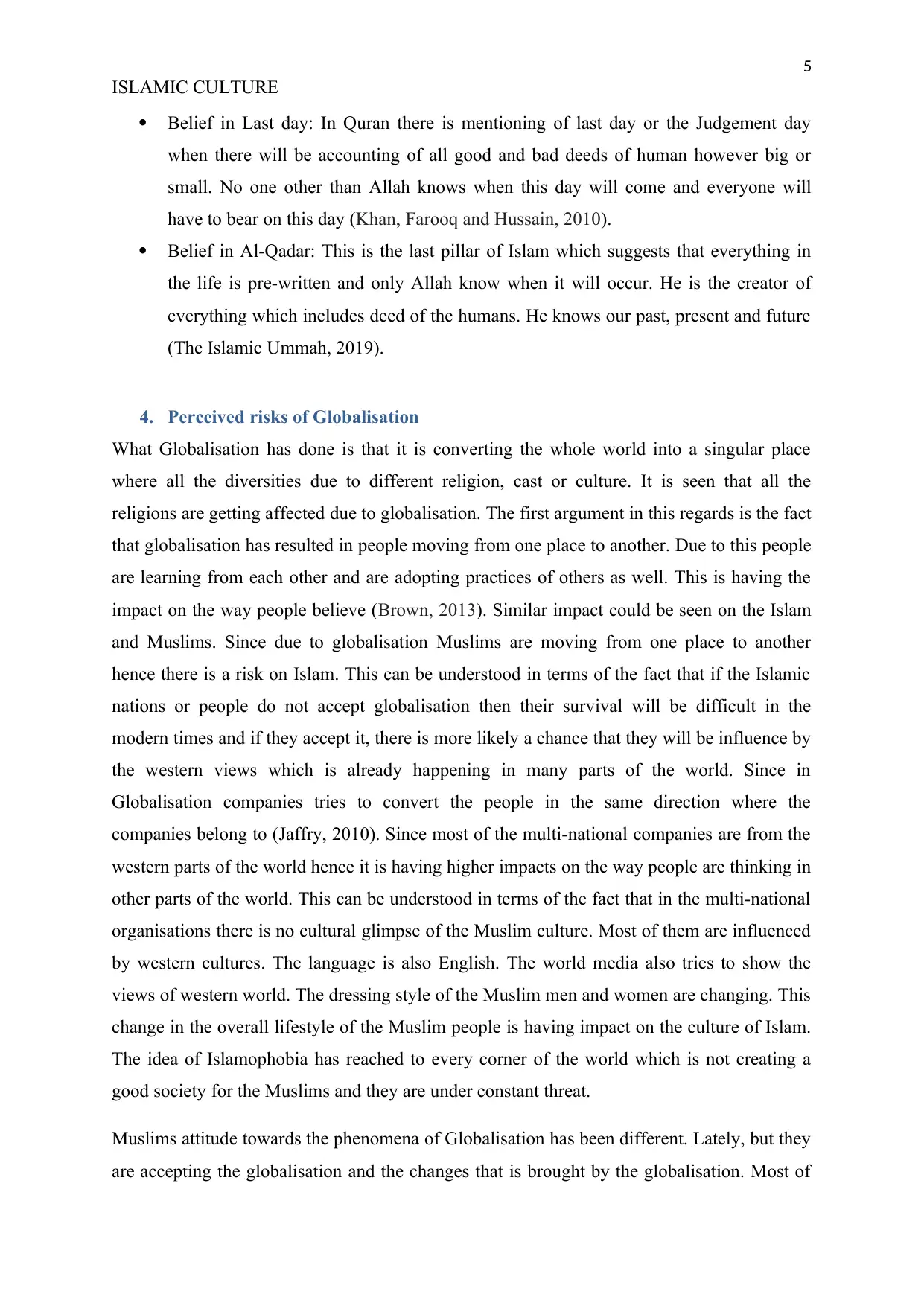
5
ISLAMIC CULTURE
Belief in Last day: In Quran there is mentioning of last day or the Judgement day
when there will be accounting of all good and bad deeds of human however big or
small. No one other than Allah knows when this day will come and everyone will
have to bear on this day (Khan, Farooq and Hussain, 2010).
Belief in Al-Qadar: This is the last pillar of Islam which suggests that everything in
the life is pre-written and only Allah know when it will occur. He is the creator of
everything which includes deed of the humans. He knows our past, present and future
(The Islamic Ummah, 2019).
4. Perceived risks of Globalisation
What Globalisation has done is that it is converting the whole world into a singular place
where all the diversities due to different religion, cast or culture. It is seen that all the
religions are getting affected due to globalisation. The first argument in this regards is the fact
that globalisation has resulted in people moving from one place to another. Due to this people
are learning from each other and are adopting practices of others as well. This is having the
impact on the way people believe (Brown, 2013). Similar impact could be seen on the Islam
and Muslims. Since due to globalisation Muslims are moving from one place to another
hence there is a risk on Islam. This can be understood in terms of the fact that if the Islamic
nations or people do not accept globalisation then their survival will be difficult in the
modern times and if they accept it, there is more likely a chance that they will be influence by
the western views which is already happening in many parts of the world. Since in
Globalisation companies tries to convert the people in the same direction where the
companies belong to (Jaffry, 2010). Since most of the multi-national companies are from the
western parts of the world hence it is having higher impacts on the way people are thinking in
other parts of the world. This can be understood in terms of the fact that in the multi-national
organisations there is no cultural glimpse of the Muslim culture. Most of them are influenced
by western cultures. The language is also English. The world media also tries to show the
views of western world. The dressing style of the Muslim men and women are changing. This
change in the overall lifestyle of the Muslim people is having impact on the culture of Islam.
The idea of Islamophobia has reached to every corner of the world which is not creating a
good society for the Muslims and they are under constant threat.
Muslims attitude towards the phenomena of Globalisation has been different. Lately, but they
are accepting the globalisation and the changes that is brought by the globalisation. Most of
ISLAMIC CULTURE
Belief in Last day: In Quran there is mentioning of last day or the Judgement day
when there will be accounting of all good and bad deeds of human however big or
small. No one other than Allah knows when this day will come and everyone will
have to bear on this day (Khan, Farooq and Hussain, 2010).
Belief in Al-Qadar: This is the last pillar of Islam which suggests that everything in
the life is pre-written and only Allah know when it will occur. He is the creator of
everything which includes deed of the humans. He knows our past, present and future
(The Islamic Ummah, 2019).
4. Perceived risks of Globalisation
What Globalisation has done is that it is converting the whole world into a singular place
where all the diversities due to different religion, cast or culture. It is seen that all the
religions are getting affected due to globalisation. The first argument in this regards is the fact
that globalisation has resulted in people moving from one place to another. Due to this people
are learning from each other and are adopting practices of others as well. This is having the
impact on the way people believe (Brown, 2013). Similar impact could be seen on the Islam
and Muslims. Since due to globalisation Muslims are moving from one place to another
hence there is a risk on Islam. This can be understood in terms of the fact that if the Islamic
nations or people do not accept globalisation then their survival will be difficult in the
modern times and if they accept it, there is more likely a chance that they will be influence by
the western views which is already happening in many parts of the world. Since in
Globalisation companies tries to convert the people in the same direction where the
companies belong to (Jaffry, 2010). Since most of the multi-national companies are from the
western parts of the world hence it is having higher impacts on the way people are thinking in
other parts of the world. This can be understood in terms of the fact that in the multi-national
organisations there is no cultural glimpse of the Muslim culture. Most of them are influenced
by western cultures. The language is also English. The world media also tries to show the
views of western world. The dressing style of the Muslim men and women are changing. This
change in the overall lifestyle of the Muslim people is having impact on the culture of Islam.
The idea of Islamophobia has reached to every corner of the world which is not creating a
good society for the Muslims and they are under constant threat.
Muslims attitude towards the phenomena of Globalisation has been different. Lately, but they
are accepting the globalisation and the changes that is brought by the globalisation. Most of
⊘ This is a preview!⊘
Do you want full access?
Subscribe today to unlock all pages.

Trusted by 1+ million students worldwide
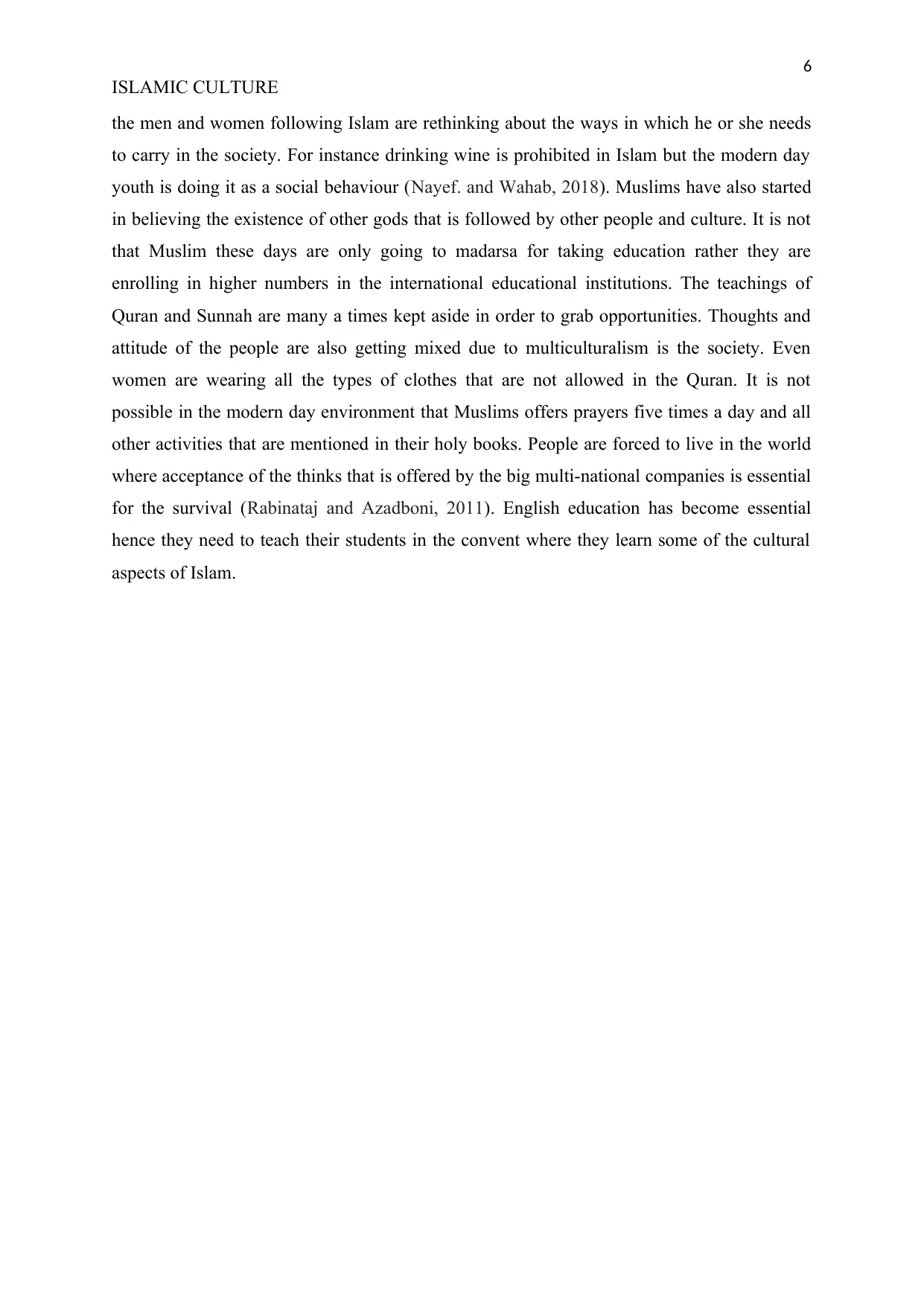
6
ISLAMIC CULTURE
the men and women following Islam are rethinking about the ways in which he or she needs
to carry in the society. For instance drinking wine is prohibited in Islam but the modern day
youth is doing it as a social behaviour (Nayef. and Wahab, 2018). Muslims have also started
in believing the existence of other gods that is followed by other people and culture. It is not
that Muslim these days are only going to madarsa for taking education rather they are
enrolling in higher numbers in the international educational institutions. The teachings of
Quran and Sunnah are many a times kept aside in order to grab opportunities. Thoughts and
attitude of the people are also getting mixed due to multiculturalism is the society. Even
women are wearing all the types of clothes that are not allowed in the Quran. It is not
possible in the modern day environment that Muslims offers prayers five times a day and all
other activities that are mentioned in their holy books. People are forced to live in the world
where acceptance of the thinks that is offered by the big multi-national companies is essential
for the survival (Rabinataj and Azadboni, 2011). English education has become essential
hence they need to teach their students in the convent where they learn some of the cultural
aspects of Islam.
ISLAMIC CULTURE
the men and women following Islam are rethinking about the ways in which he or she needs
to carry in the society. For instance drinking wine is prohibited in Islam but the modern day
youth is doing it as a social behaviour (Nayef. and Wahab, 2018). Muslims have also started
in believing the existence of other gods that is followed by other people and culture. It is not
that Muslim these days are only going to madarsa for taking education rather they are
enrolling in higher numbers in the international educational institutions. The teachings of
Quran and Sunnah are many a times kept aside in order to grab opportunities. Thoughts and
attitude of the people are also getting mixed due to multiculturalism is the society. Even
women are wearing all the types of clothes that are not allowed in the Quran. It is not
possible in the modern day environment that Muslims offers prayers five times a day and all
other activities that are mentioned in their holy books. People are forced to live in the world
where acceptance of the thinks that is offered by the big multi-national companies is essential
for the survival (Rabinataj and Azadboni, 2011). English education has become essential
hence they need to teach their students in the convent where they learn some of the cultural
aspects of Islam.
Paraphrase This Document
Need a fresh take? Get an instant paraphrase of this document with our AI Paraphraser
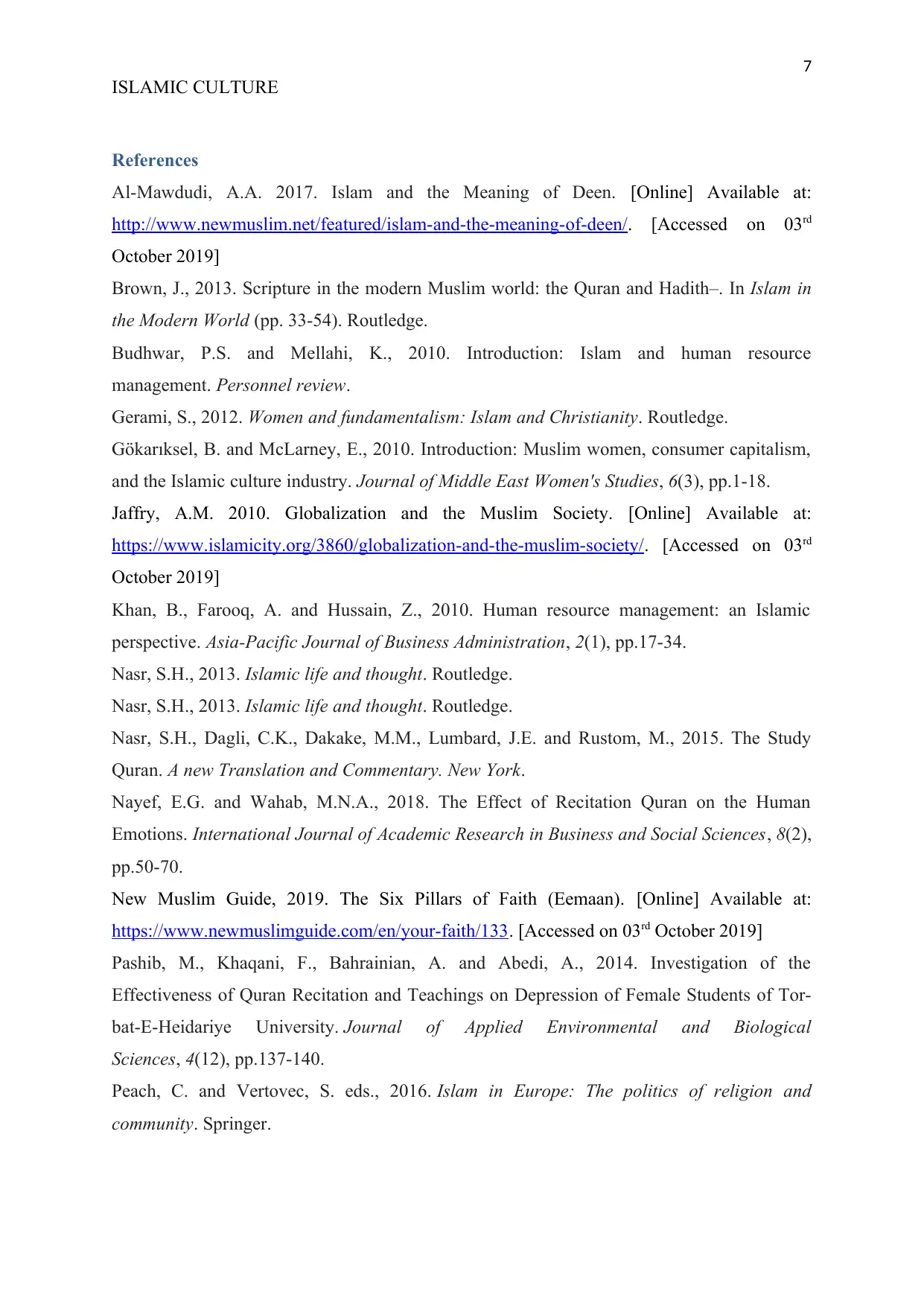
7
ISLAMIC CULTURE
References
Al-Mawdudi, A.A. 2017. Islam and the Meaning of Deen. [Online] Available at:
http://www.newmuslim.net/featured/islam-and-the-meaning-of-deen/. [Accessed on 03rd
October 2019]
Brown, J., 2013. Scripture in the modern Muslim world: the Quran and Hadith–. In Islam in
the Modern World (pp. 33-54). Routledge.
Budhwar, P.S. and Mellahi, K., 2010. Introduction: Islam and human resource
management. Personnel review.
Gerami, S., 2012. Women and fundamentalism: Islam and Christianity. Routledge.
Gökarıksel, B. and McLarney, E., 2010. Introduction: Muslim women, consumer capitalism,
and the Islamic culture industry. Journal of Middle East Women's Studies, 6(3), pp.1-18.
Jaffry, A.M. 2010. Globalization and the Muslim Society. [Online] Available at:
https://www.islamicity.org/3860/globalization-and-the-muslim-society/. [Accessed on 03rd
October 2019]
Khan, B., Farooq, A. and Hussain, Z., 2010. Human resource management: an Islamic
perspective. Asia-Pacific Journal of Business Administration, 2(1), pp.17-34.
Nasr, S.H., 2013. Islamic life and thought. Routledge.
Nasr, S.H., 2013. Islamic life and thought. Routledge.
Nasr, S.H., Dagli, C.K., Dakake, M.M., Lumbard, J.E. and Rustom, M., 2015. The Study
Quran. A new Translation and Commentary. New York.
Nayef, E.G. and Wahab, M.N.A., 2018. The Effect of Recitation Quran on the Human
Emotions. International Journal of Academic Research in Business and Social Sciences, 8(2),
pp.50-70.
New Muslim Guide, 2019. The Six Pillars of Faith (Eemaan). [Online] Available at:
https://www.newmuslimguide.com/en/your-faith/133. [Accessed on 03rd October 2019]
Pashib, M., Khaqani, F., Bahrainian, A. and Abedi, A., 2014. Investigation of the
Effectiveness of Quran Recitation and Teachings on Depression of Female Students of Tor-
bat-E-Heidariye University. Journal of Applied Environmental and Biological
Sciences, 4(12), pp.137-140.
Peach, C. and Vertovec, S. eds., 2016. Islam in Europe: The politics of religion and
community. Springer.
ISLAMIC CULTURE
References
Al-Mawdudi, A.A. 2017. Islam and the Meaning of Deen. [Online] Available at:
http://www.newmuslim.net/featured/islam-and-the-meaning-of-deen/. [Accessed on 03rd
October 2019]
Brown, J., 2013. Scripture in the modern Muslim world: the Quran and Hadith–. In Islam in
the Modern World (pp. 33-54). Routledge.
Budhwar, P.S. and Mellahi, K., 2010. Introduction: Islam and human resource
management. Personnel review.
Gerami, S., 2012. Women and fundamentalism: Islam and Christianity. Routledge.
Gökarıksel, B. and McLarney, E., 2010. Introduction: Muslim women, consumer capitalism,
and the Islamic culture industry. Journal of Middle East Women's Studies, 6(3), pp.1-18.
Jaffry, A.M. 2010. Globalization and the Muslim Society. [Online] Available at:
https://www.islamicity.org/3860/globalization-and-the-muslim-society/. [Accessed on 03rd
October 2019]
Khan, B., Farooq, A. and Hussain, Z., 2010. Human resource management: an Islamic
perspective. Asia-Pacific Journal of Business Administration, 2(1), pp.17-34.
Nasr, S.H., 2013. Islamic life and thought. Routledge.
Nasr, S.H., 2013. Islamic life and thought. Routledge.
Nasr, S.H., Dagli, C.K., Dakake, M.M., Lumbard, J.E. and Rustom, M., 2015. The Study
Quran. A new Translation and Commentary. New York.
Nayef, E.G. and Wahab, M.N.A., 2018. The Effect of Recitation Quran on the Human
Emotions. International Journal of Academic Research in Business and Social Sciences, 8(2),
pp.50-70.
New Muslim Guide, 2019. The Six Pillars of Faith (Eemaan). [Online] Available at:
https://www.newmuslimguide.com/en/your-faith/133. [Accessed on 03rd October 2019]
Pashib, M., Khaqani, F., Bahrainian, A. and Abedi, A., 2014. Investigation of the
Effectiveness of Quran Recitation and Teachings on Depression of Female Students of Tor-
bat-E-Heidariye University. Journal of Applied Environmental and Biological
Sciences, 4(12), pp.137-140.
Peach, C. and Vertovec, S. eds., 2016. Islam in Europe: The politics of religion and
community. Springer.
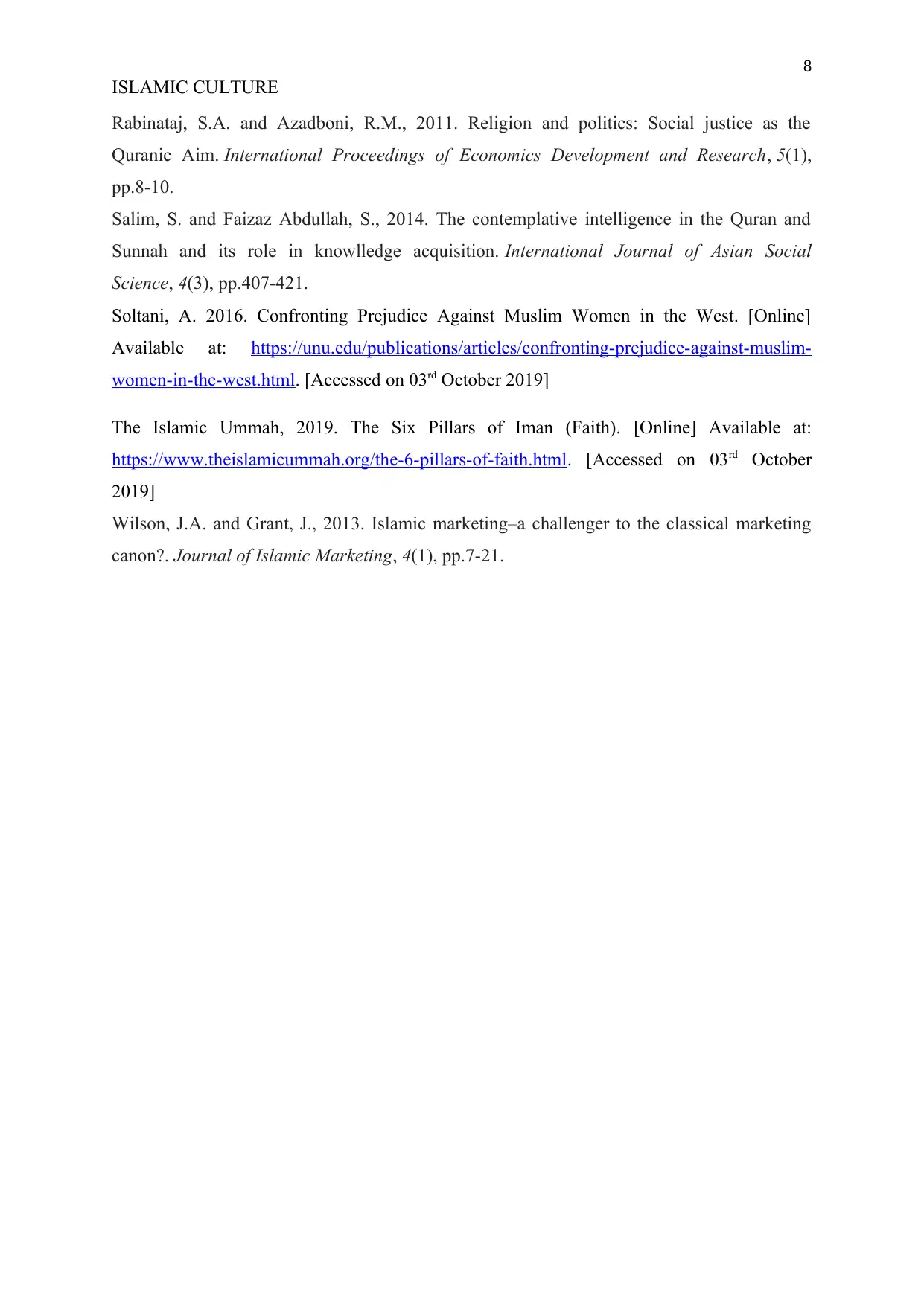
8
ISLAMIC CULTURE
Rabinataj, S.A. and Azadboni, R.M., 2011. Religion and politics: Social justice as the
Quranic Aim. International Proceedings of Economics Development and Research, 5(1),
pp.8-10.
Salim, S. and Faizaz Abdullah, S., 2014. The contemplative intelligence in the Quran and
Sunnah and its role in knowlledge acquisition. International Journal of Asian Social
Science, 4(3), pp.407-421.
Soltani, A. 2016. Confronting Prejudice Against Muslim Women in the West. [Online]
Available at: https://unu.edu/publications/articles/confronting-prejudice-against-muslim-
women-in-the-west.html. [Accessed on 03rd October 2019]
The Islamic Ummah, 2019. The Six Pillars of Iman (Faith). [Online] Available at:
https://www.theislamicummah.org/the-6-pillars-of-faith.html. [Accessed on 03rd October
2019]
Wilson, J.A. and Grant, J., 2013. Islamic marketing–a challenger to the classical marketing
canon?. Journal of Islamic Marketing, 4(1), pp.7-21.
ISLAMIC CULTURE
Rabinataj, S.A. and Azadboni, R.M., 2011. Religion and politics: Social justice as the
Quranic Aim. International Proceedings of Economics Development and Research, 5(1),
pp.8-10.
Salim, S. and Faizaz Abdullah, S., 2014. The contemplative intelligence in the Quran and
Sunnah and its role in knowlledge acquisition. International Journal of Asian Social
Science, 4(3), pp.407-421.
Soltani, A. 2016. Confronting Prejudice Against Muslim Women in the West. [Online]
Available at: https://unu.edu/publications/articles/confronting-prejudice-against-muslim-
women-in-the-west.html. [Accessed on 03rd October 2019]
The Islamic Ummah, 2019. The Six Pillars of Iman (Faith). [Online] Available at:
https://www.theislamicummah.org/the-6-pillars-of-faith.html. [Accessed on 03rd October
2019]
Wilson, J.A. and Grant, J., 2013. Islamic marketing–a challenger to the classical marketing
canon?. Journal of Islamic Marketing, 4(1), pp.7-21.
⊘ This is a preview!⊘
Do you want full access?
Subscribe today to unlock all pages.

Trusted by 1+ million students worldwide
1 out of 9
Related Documents
Your All-in-One AI-Powered Toolkit for Academic Success.
+13062052269
info@desklib.com
Available 24*7 on WhatsApp / Email
![[object Object]](/_next/static/media/star-bottom.7253800d.svg)
Unlock your academic potential
Copyright © 2020–2025 A2Z Services. All Rights Reserved. Developed and managed by ZUCOL.





